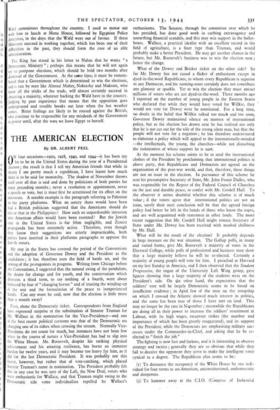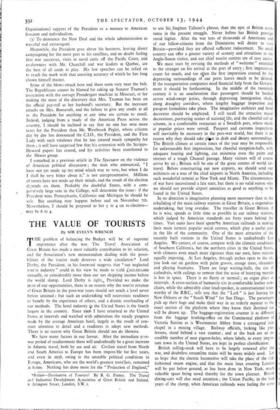THE AMERICAN ELECTION
By DR. ALBERT PEEL
AN four occasions-192o, 1928, 194o, and 1944—it has been my U lot to be in the United States during the year of a Presidential election ; the result is that I tell my AmeriOan friends that while in theory I am pretty much a republican, I have learnt how much there is to be said for monarchy. The shadow of November throws itself over all that is said and done by politicians of both parties for many preceding months ; never a resolution or appointment, never a speech or vote, but it must first be scrutinised for its effect on the electorate. A notable example is the paragraph referring to Palestine in the party platforms. What an outcry there would have been had a British politician suggested that the Americans should do this or that in the Philippines! How such an unpardonable intrusion into American affairs would have been resented! But the Jewish vote in the United States is •far frbm negligible, and Zionist propaganda has been extremely active. Therefore, even though they know their suggestions are utterly impracticable, both parties have inserted in their platforms paragraphs to appease the Jewish voters.
My stay in the States has covered the period of the Conventions and the adoption of Governor Dewey and the President as the candidates ; it has therefore seen the field of battle set, and the arming of the protagonists in progress. Writing from Chicago before the Conventions, I suggested that the natural swing of the pendulum, the desire for change and for youth, and the conservatism which distrusts a third term, to say nothing of a fourth, were about balanced by fear of " changing horses " and of trusting the winding-up of the war and the formulation of the . peace to inexperienced hands. Can any more be said, now that the election is little more than a month away?
First, about the Democratic ticket. Correspondents from England have expressed surprise at the substitution of Senator Truman for Mr. Wallace in the nomination for the Vice-Presidency—and one of the best recent political cartoons was that of the Democratic ass changing one of its riders when crossing the stream. Normally Vice- Presidents do not count for much, but instances have not been few when in the course of nature a Vice-President has had to slip into the White House. Mr. RoOsevelt, despite his striking physical achievement and his amazing resilience, has borne an immense burden for twelve ye,ars, and it may become too heavy for him, as it did for the last Democratic President. It was probal;ly not this factor, however, but rather that of vote-catching, which placed Senator Truman's name in nomination. The President probably felt that in any case he was sure of the Left, the New Deal, voters who Were enthusiastic for. Wallace, and that Truman might swing to the Democratic side some individualists repelled by Wallace's enthusiasms. The Senator, through the committee over which he has presided, has done good work in curbing extravagance and unearthing financial scandals, and this may win support in the ballot- boxes. Wallace, a practical idealist with an excellent record in the, field of agriculture, is a finer type than Truman, and would probably make a better President. He may get another chance-in the future, but Mr. Roosevelt's business was to win the election now ; hence the change.
What of the Dewey and Bricker ticket on the other side? So far Mr. Dewey has not raised a flicker of enthusiasm except in dyed-in-the-wool Republicans, to whom every Republican is superior to any Democrat, and his running-mate certainly does not contribute any glamour or sparkle. Yet to win the election they must attract millions of voters who are not dyed-in-the-wool. Three months ago I reported on the number of young people in the Eastern States who declared that while they would have voted for Willkie, they would not vote for Dewey were he nominated. For a long time, no doubt in the belief that Willkie talked too much and too soon, Governor Dewey maintained silence on matters of international policy, but as the election has drawn near he has realised not only that he is not cut out for the role of the strong silent man, but that the people will not vote for a negation ; he has therefore endeavoured to elaborate a policy which will appeal to the internationally-minded —the intellectuals, the young, the churches—while not disturbing the isolationists of whose support he is sure.
At the moment his scheme seems to be to steal the international clothes of the President by proclaiming that international politics is above party, that Republicans and Democrats are agreed on the organisation of the post-war world, and that, therefore, these things are not an issue in the election. In pursuance of this scheme he sent his presumptive Secretary of State, Mr. John Foster Dulles, who was responsible for the Report of the Federal Council of Churches on the just and durable peace, to confer with Mr. Cordell Hull. To the observer it seems doubtful whether this scheme is of much value ; if the voters agree that international politics are not an issue, surely their next conclusion will be that the agreed foreign policy had better be left in the hands of those who know the ropes, and are well acquainted with statesmen in other lands. The more recent suggestion that Mr. Cordell Hull might remain Secretary of State under Mr. Dewey has been received with marked chilliness by Mr. Hull.
What will be the result of the election? It probably depends in large measure on the war situation. The Gallup polls, in many and varied forms, give Mr. Roosevelt a majority of votes in the Electoral College, while polls of professional and business men show that a large majority believe he will be re-elected. Certainly a majority of young people will vote for him. I preached at Harvard on my last Sunday in America, and I then observed that the Student Progressive, the organ of the University Left Wing group, gave figures showing that a large majority of the students were on the President's side. On the other hand, the expectation that the soldiers' vote will be largely Democratic seems to be based on insufficient evidence ; in April few of the men on the troopship on which I crossed the Atlantic showed much interest in politics, and the same has been true of those I have met on land. This may no longer be the case in November ; meanwhile the Republicans are doing all in their power to increase the soldiers' resentment at Labour, with its high wages, recurrent strikes (the number and importance of which has been greatly exaggerated), and its support of the President, while the Democrats are emphasising military suc- cesses under the Commander-in-Chief, and asking that he be re- elected to " finish the job."
The fighting is now fast and furious, and it is interesting to observe strategy and tactics ; generally they are so obvious that while they fail to deceive the opponent they serve to make the intelligent voter cynical to a degree. The Republican plan seems to be: (I) To denounce the occupan0 of the White House by one indi- vidual for four terms as un-American, unconstitutional, undemocratic and dangerous.
(2) To hammer away at the C.I.O. (Congress of Industrial Organisations) support of the President as a menace to American freedom and individualism.
(3) To denounce the New Deal and the whole administration as wasteful and extravagant.
Meanwhile, the President goes about his business, leaving direct campaigning for the most part to his satellites, and no doubt feeling that war successes, visits to naval units off the Pacific Coast, and conferences with Mr. Churchill and war leaders at Quebec, are the best of all cards to play. His few speeches can be relied on to reach the mark with that unerring accuracy of which he has long shown himself rhaster.
Some of the blows struck here and there seem very near the belt. The Republicans cannot be blamed for raking up Senator Truman's association with the corrupt Prendergast machine in Missouri, or for making the most of the discovery that Mrs. Truman has been on the official pay-roll as her husband's secretary. But the incessant attacks on Mrs. Roosevelt, and the failure to give any credit at all to the PresideAt for anything at any time are certain to recoil.
Indeed, judging from a study of the American Press across the country, I should be inclined to say that no one has won more
votes for the President than Mr. Westbrook Peglei, whose column day by day has denounced the C.I.O., the President, and the First Lady with such virulence that he has created much sympathy for them ; it will have surprised few that his connexion with the Scripps- Howard papers has ceased, and his activities been transferred to the Hearst group.
I remarked in a previous article in The Spectator on the violence of American political discussion ; the man who announced, " I
have not yet made up my mind which way to vote, but when I do I shall be very bitter about it," is not unrepresentative. Millions of voters have not made up their minds, and the result of the election depends on them. Probably the doubtful States, with a com- paratively large vote in the College, will determine the issue: if the President wins Pennsylvania, California and Michigan he should be
safe. But anything may happen before and on November 7th. Nevertheless, I should be prepared to bet 5 to 4 on re-election-- may be 6 to 4.



























 Previous page
Previous page